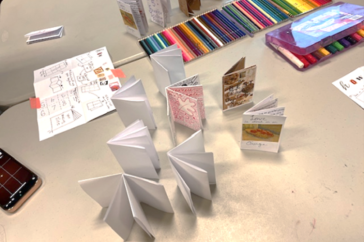 |
| Pictured (l to r): Alecia Magnifico, assistant professor of English at UNH; Kim Beidleman, teacher at Prospect Mountain High School, Alton, N.H.; Michelle Spiller, teacher at Prospect Mountain High School, Alton, N.H.; and Laura Smith, senior lecturer in English at UNH. The group is presenting at a colloquium on student writing and college readiness held at UNH on September 16, 2016. Photo by Perry Smith. |
For many students, the transition from high school to college can be challenging. What they might not realize, though, is that the transition is also challenging for their educators, especially when it comes to teaching writing.
For high school teachers, preparing students for writing in college can be a guessing game — will the skills they’re emphasizing help students succeed at the college level? What skills do college instructors expect students to have? And what’s the best way to balance teaching those skills with preparing students for assessment tests?
The questions are similar for many college instructors. What did their students learn in high school, and how do they get students to talk about what they’ve learned so far about writing?
“There are many conversations happening about college readiness, but we’re not talking about it as college writing instructors and high school teachers,” says Christina Ortmeier-Hooper, associate professor of English and director of first-year writing.
The answer to those questions, according to Ortmeier-Hooper, can be found in conversations between high school and college educators. That’s why she and Alecia Magnifico, assistant professor of English and coordinator of the English Teaching Program, began the School-University Dialogues on College Readiness in Writing in 2013. What began that year as a small lunchtime meeting of educators has grown into a state-wide network, and the group held its first colloquium, “Traditions, Transitions, and Transformations: Student Writing and College Readiness,” at UNH on September 16, 2016.
High school teachers and college writing instructors “have the same challenges,” Magnifico says. “They might look a little different, and there are differences in district- and national-level policies, and those conversations shift in college,” but the challenges are often similar.
For example, after the group’s first meeting, Magnifico says all the instructors talked about how students from middle school through college struggle with revising their writing and staying engaged in the process.
The discussions can be wide-ranging, with conversations about research strategies, digital literacy, and more. Instructors visit each other’s class rooms and talk with guest speakers — including high school and college students themselves, which Ortmeier-Hooper says keeps students at the center of the conversation.
“As composition director, it helps me think about how we make the transition from high school to college easier for students,” Ortmeier-Hooper says. “Students want to know we’re having these conversations, and … it leads to discussions in the first-year writing classrooms about what skills and types of experiences they’ve had that we can build on.”
Both Magnifico and Ortmeier-Hooper say the conversational aspect of the group is important. Simply telling high school teachers what’s happening in college classrooms is limiting for both sides, and the group’s “bidirectional dialogue” fits in to the English Department’s tradition of deepening the field of composition studies. The discussions have shifted the focus on college readiness from assessment tests to how high schools and colleges can work more closely together.
“We see this as the public humanities part of what we do,” Ortmeier-Hooper says. “This is part of a broader public discussion around education and writing, and we’re trying to build cross-institutional engagement. In a state this size, we’re all invested in this conversation.”
There are about 20 educators in the group, with high school teachers from Exeter High School, Coe-Brown Northwood Academy, Prospect Mountain Academy,
 |
Manchester West High School, Sanborn Regional High School and the Rollinsford Grade School, along with instructors from the English Department. Over time, Magnifico says, the group shifted from talking about the high school-to-college transition to conducting original research.
“The colloquium is our first round of showing what we’ve learned to other people; then, we’re taking our findings on the road to the National Council of Teachers of English convention in November,” Magnifico says.
The group has also given alumni of the English Teaching program a chance to return to UNH. Kim Beidleman ’12 ’13G teaches two English classes at Prospect Mountain High School in Alton and has been part of the dialogues group since 2014.
“It’s helped me think more about the end-goals for my students,” Beidleman says. “This year, my research group has looked at revision strategies across grade levels, and I’ve had the opportunity to learn about and try new activities in my classroom.”
For Laura Smith ’01G ’07G, a senior lecturer in English at UNH, the Dialogues group helps her stay current with the latest developments in teaching writing. “We talk about students’ writing at secondary- and post-secondary levels, pooling ideas to help students grow as writers. Learning about high school students’ writing helps us at the college level build on those experiences in a smooth, logical way.”
Magnifico and Ortmeier-Hooper want to keep the conversation going. Grants from the New England Reading Association, the UNH Center for the Humanities and the New England Reading Association have helped support the group, which Ortmeier-Hooper says is one of the only cross-institutional groups in the country to take a sustained look at what the transition between high school and college means for student writers.
“It’s become a really great community,” she says.















































